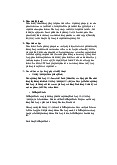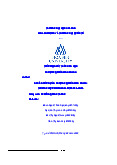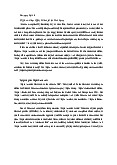















Preview text:
ASEAN Journal of CI-EL and Applied Philosophy
Vol. 1, No. 1 (2023), p. 30 – 4 ,
5 doi: DOI 10.22146/arcelap.v1i1.9733
The Influence of Vietnam's Unique Social Culture on Business Nguyen Viet Khoi
School of Interdisciplinary Studies (SIS), Vietnam National University, Hanoi (VNU) Email: nvkhoi@vnu.edu.vn Le Thanh Huong
University of Economics & Business (UEB), Vietnam National University, Hanoi (VNU), Vietnam Abstract
In the current context of international economic integration, it is
necessary to recognize the role of the social culture in the society,
especially in the context of business environment. This paper
reviewed and discussed the influence of Vietnamese’s unique social
culture on business. Analyze the practice and theory of Vietnam’s
unique social culture in ancient and present social life, from which
evaluations and suggestions - this is one of the main research
objectives of this topic. By comprehending these cultural and
historical backgrounds, it is possible to diminish perplexity and
discord, while simultaneously laying the groundwork for a project
that seems to be immensely significant for Vietnam.
Keywords: Unique Social Culture, Business In Vietnam, Confucianism, Collectivism.
Received: March, 13 2022 |Reviewed: July, 3 2023 |Accepted: September, 1 2023
________________________________________________________________ INTRODUCTION
Vietnam is prospering in the present times. In 2022, Vietnam's
economy experienced a significant expansion, reaching a record
high of 8.02%, which surpasses the target of 6.5% established by the
National Assembly. This also marks the highest growth rate in
Nguyen Viet Khoi, Le Thanh Huong 31
Southeast Asia (The Investor, 2022). Nonetheless, the primary factor
contributing to the high growth rate in 2022 is the low growth base
in the preceding two pandemic years of 2020 and 2021, which were
recorded at 2.91% and 2.58%, respectively (ibid.). Vietnam's total
import-export turnover in 2022 amounted to approximately $732.5
billion, showing a 9.5% year-on-year increase. Exports surged by
10.6% to roughly $371.85 billion, surpassing the National Assembly
and government's goal by 8%. Of particular note, the export of
agricultural, forestry, and fishery products experience. In line with
the economic recovery, the disbursement of foreign direct
investment in Vietnam in 2022 reached almost $22.4 billion,
reflecting a 13.5% increase compared to the same period in the
previous year (ibid.). The investment is growing, and urging
companies to evaluate the long-term commercial opportunities
against the current obstacles in entering the market. The question is,
under what conditions could these companies establish their businesses in Vietnam?
Vietnam owes much of its current success to a significant
moment in its history when the Vietnamese Communist Party and
state changed their direction from a centralized planning model to
a free-market economy. Before 1986, Vietnam had adopted a
socialist command economy that followed the Soviet-style economic
model, with the state controlling most industrial and agricultural
enterprises and overseeing procurement and distribution activities,
including foreign trade (Do et al., 2007). However, due to poverty
and the end of subsidies from the Soviet Union between 1986 and
1989, the government had to liberalize the economy. In 1986, the
Vietnamese government implemented the "renovation" (doi moi)
policy, which entailed disbanding agricultural collectives and
announcing plans to privatize state-owned enterprises (ibid.).
The government established new industrial zones and
partnerships between foreign and state-owned enterprises.
Although state-owned enterprises remained dominant, consumer
demand started to influence the market in addition to the previous
state-managed procurement policies and production targets. These
32 Article | ARCELAP, Vol. 1, No. 1, 2023
changes led to a significant expansion of the service sector and a
rapid increase in foreign investment. The resulting economic
growth was impressive, with a real GDP growth rate of just over 8%
in 1992 and 9.5% in 1995. This economic success brought about
significant social and economic changes, including a decrease in
poverty, improved living standards, and a construction boom,
mainly in urban areas. By 1995, Hanoi had been transformed from a
relatively quiet Southeast Asian capital into a city that hosted the
head offices of 450 foreign companies.
When it comes to evaluation of aspects of the Vietnamese
business culture that has grown with this expanding economy, one
may perceive social culture as business values. Social culture refers
to the norms, values, and beliefs that are shared among individuals
in a particular society (source). In Vietnam, social culture has a rich
and unique social culture that has a profound impact on various
aspects of the country’s business practices. It influences on how
business is conducted, the relationships between employees,
customers and business owners, and the overall business atmosphere.
The characteristics of Vietnamese social culture include a
strong emphasis on Confucianism and collectivism, a high level of
respect for authority, and an emphasis on maintaining face and
personal relationships (Molyneux, 1995; Tran Ngoc Them, 1997).
These cultural values and beliefs often play a crucial role in how
business deals are struck and how business partners interact with
each other. The uniqueness of Vietnamese social culture is reflected
in its history and traditions, which have been shaped by centuries
of influences from China, France, and the United States, among
others. This has resulted in a culture that is both distinct and
dynamic, and one that has a strong influence on the country's
economy and business practices.
This study explore the characteristics of Vietnamese social
culture, the ways in which it is unique, and its influence on the
business community. Understanding the characteristics of this
culture and its influence on business is crucial for companies
Nguyen Viet Khoi, Le Thanh Huong 33
operating in Vietnam, as well as for those looking to expand into the
market. A challenge when examining businesses in most Asian
countries is the scarcity of accurate data and investigative
information on business (Lasserr and Schutte, 1999: 143). As a result,
this paper relies on case studies of Vietnamese business practices,
which are discussed in relation to the historical, cultural, and political background. THE SOCIAL CULTURE
Social culture refers to the shared norms, values, beliefs, and
behaviors that characterize a particular society (Tsatsou, 2011). It is
a complex and multi-faceted concept that has been the subject of
much research and analysis in the fields of sociology, psychology,
and anthropology. One of the earliest and most influential theories
of social culture is that of German sociologist Max Weber (1949),
who defined culture as the "spirit" of a society and characterized it
as the set of ideas, beliefs, and values that shape individual
behavior. Another influential theory is that of French sociologist
Emile Durkheim (1964), who argued that culture is the product of
social interaction and serves to maintain social order.
While social culture varies from one society to another, there
are certain cultural universals that are found in all societies (Tsatsou,
2011). For example, all cultures have a system of beliefs and values
that guide behavior, as well as a set of norms that regulate social
interactions. Additionally, all cultures have a shared history and a
sense of identity that helps to bind individuals together.
Despite these universal elements, social culture is also
characterized by diversity and complexity. Cultural differences can
arise from a variety of factors, such as geographic location, history,
and economic development (Tsatsou, 2011). For example, cultures
in different regions of the world may have different attitudes
towards authority, the role of the individual in society, and the importance of the
family.https://jurnal.ugm.ac.id/v3/arcelap/workflow/index/9733/5
34 Article | ARCELAP, Vol. 1, No. 1, 2023
Social culture has a profound impact on individual behavior.
It shapes attitudes, values, and beliefs, and provides a framework
for interpreting the world (Tsatsou, 2011). Additionally, cultural
norms and values provide individuals with a sense of identity and
belonging, and help to regulate their behavior in social situations.
Social culture also has a significant impact on society as a whole. It
shapes the way individuals interact with one another, and helps to
maintain social order and stability. Additionally, culture can
influence economic development, political systems, and the distribution of resources.
THE UNIQUE SOCIAL CULTURE IN VIETNAM
Vietnam is a country located in Southeast Asia that has a rich
and long-standing history. In its early years, the Vietnamese shared
many common characteristics with other countries in the region,
which is believed to have been home to the beginnings of human
history and civilization (Molyneux, 1995; Tran Ngoc Them, 1997).
Throughout its history, Vietnam has consistently resisted foreign
invasions, particularly from the Chinese. Unlike many developing
nations, Vietnam has a long history of centralizing its administrative
systems, dating back at least two thousand years (Fforde and de
Vylder, 1996, p.47). For over two thousand years, Vietnam, along
with Korea, Japan, and China, was part of what is referred to as the
East Asian classical civilization (Woodside, 1971). The first recorded
kingdom in Vietnam, Van Lang, dates back to over 2,500 years and
was ruled by the Hung kings. Vietnam then fell under Chinese rule
for over 1,000 years, which heavily influenced its culture and
institutions (Ha Van Tan, 1983; Tran Ngoc Them, 1997). After
gaining independence, Vietnam was ruled by two dynasties and
was then occupied by France and the US (Lan Nguyen, 2009). The
victory of the North in the Vietnam civil war led to a united Vietnam
under Communist rule, with an open-door policy since 1986 aimed at a market economy (ibid.).
Geographically located to the south of China and was part of
the Chinese Empire for a thousand years, Vietnam absorbs cultural
Nguyen Viet Khoi, Le Thanh Huong 35
exchange and integration including genes, language and other
cultural elements, thereby showing the strong influence of Chinese
culture in Vietnam (Lan Nguyen, 2009). Scholars have seen Vietnam
as having a Neo-Confucian society, an idea backed by the
examination of the central principles of Confucianism and its
history within Vietnam (Woodside, 1998; Jamieson, 1993; Fforde
and de Vylder, 1996; Smith, 1973). Regarding its root of social
culture, the values refer to the obedience to authority, respect for
elders, and strong family ties. These values are evident in the close-
knit families and respect for hierarchy that are common in Vietnam.
The family is considered the fundamental unit of society, and
individuals are expected to prioritize the needs of the family over their own individual needs.
Confucianism places a great emphasis on regulating
interpersonal relationships as a fundamental aspect of its ethical
system. Failure to maintain proper conduct within these
relationships can result in societal disorders, which can ultimately
disrupt the balance between individuals and the universe. Since the
cosmic world operates in harmony, humans strive to achieve this
same balance. Despite lacking a strong formalized organization,
Vietnamese Confucianism continues to have a significant impact on
the cultural environment in which most ethnic Vietnamese are raised.
Confucianism has had a significant and lasting impact on
Vietnamese society, shaping social order through its principles,
rituals, deference, and obedience. Although Confucianism
emphasized a highly organized hierarchical society, it also
encouraged the individual to improve while maintaining positive
relationships within the community, making it anti-individualistic.
According to Confucianism, death does not signify the
annihilation of man. Instead, Confucianists believe that the spirit
should be brought back to the family altar and worshiped, with filial
reverence being the primary duty of all Confucianists.
Confucianism has also played a powerful role in shaping
Vietnamese society, with the family being the basic unit. Therefore,
36 Article | ARCELAP, Vol. 1, No. 1, 2023
the three fundamental principles that govern Vietnamese women
are obedience to the father until married, obedience to the husband
while married, and obedience to the eldest son when the husband is
dead. However, the value of Confucianism in moderating social
behavior is being increasingly supplanted by the flexibility and
openness of a developing society.
One of the most notable aspects of Vietnamese social culture is
its hospitality. In Vietnam, it is considered rude to decline an
invitation or gift, and the country is known for its generosity and
warm hospitality. Additionally, the concept of face-saving is
important in Vietnam, where avoiding shame and preserving the
dignity of others is considered a crucial aspect of social interaction.
In business, this means that negotiations and relationships are often
focused on building trust and avoiding conflict.
While Vietnamese social culture is characterized by certain
universal elements, there are also regional and rural-urban
differences that exist within the country. For example, rural areas
may be more traditional and conservative, while urban areas are
more modern and open to change. Additionally, there may be
regional differences in attitudes towards authority and the role of the family in society.
THE INFLUENCE OF VIETNAM UNIQUE SOCIAL CULTURE ON BUSINESS CASE STUDIES –
From the influence of Confucianism and strong family ties to
the emphasis on collectivism and hospitality, understanding and
respecting these cultural norms is crucial for success in the
Vietnamese business community. Vietnam is also characterized by
a strong collectivist culture, where the needs of the group take
precedence over the needs of the individual (Tran Ngoc Them,
1997). This is evident in the strong loyalty to employers and the
emphasis on teamwork in the workplace. Additionally, social
relationships and personal connections are considered essential for
success in business, and networking is an important aspect of
Vietnamese business culture (ibid.). The study of collectivism is a
Nguyen Viet Khoi, Le Thanh Huong 37
significant aspect of East Asian cultures. When it comes to decision-
making in business, it differs from western cultures in that
consensus with all relevant stakeholders is sought after (Koslowski,
2021). Negotiations may take longer as unexpected questions must
be confirmed within the organization before a definitive reply can
be given. Once consensus is reached, project implementation is
usually swift since everyone is in agreement. "Harmony" is a vital
concept in Vietnamese society and should be maintained in
relationships with clients, suppliers, and employees (ibid.).
Therefore, a more indirect and communitarian approach should be
taken, and direct criticism, stand-alone decisions, and breaching
hierarchical structures should be avoided. Superiors should involve
their employees in decision-making, but they are still the ones who
make the final decisions in a hierarchical context, and subordinates
should not expect to take the lead.
Vietnam has a unique social culture that has a significant
impact on the way business is conducted in the country. Various
case studies were gather to illustrate this influence.
1. Relationship-Based Business Culture
In Vietnam, relationships are essential in business, and
business deals are often sealed based on the strength of the
relationships between the parties. The case of PepsiCo's joint
venture with Tan Hiep Phat in Vietnam is a clear example of the
importance of relationships in Vietnamese business culture. The
partnership was built on the existing personal relationship between
the chairman of Tan Hiep Phat and the head of PepsiCo's Asia
Pacific operations (Kissinger, 2017). Tan Hiep Phat is a Vietnamese
company that produces and sells various types of beverages,
including energy drinks, mineral water, and teas. The company is
owned by a Vietnamese family, and the chairman of the company,
Tran Qui Thanh, is known for his business acumen and entrepreneurial spirit.
In 2012, PepsiCo announced that it had formed a joint venture
with Tan Hiep Phat to distribute its soft drink brands in Vietnam.
38 Article | ARCELAP, Vol. 1, No. 1, 2023
The joint venture, called Vietnam Beverage Company, was
established with the aim of expanding PepsiCo's market share in the
country and strengthening its presence in the Asia-Pacific region (Kissinger, 2017)..
The partnership was built on the existing personal relationship
between Tran Qui Thanh and Saad Abdul-Latif, the then-head of
PepsiCo's Asia-Pacific operations. Abdul-Latif had previously
worked in Vietnam and had developed a relationship with Thanh
over the years. According to Abdul-Latif, the partnership was
successful because the two companies shared a common vision and worked well together.
The joint venture was a significant success for both companies
(Kissinger, 2017).. PepsiCo was able to expand its market share in
Vietnam, which is one of the fastest-growing markets for soft drinks
in the world. Tan Hiep Phat, on the other hand, was able to leverage
PepsiCo's marketing and distribution expertise to expand its
product offerings and increase its market share (ibid.).
2. Group Orientation
When it comes to group orientation, in Vietnam, group
orientation is valued over individualism, which means that
companies often prioritize the collective benefit over the interests of
individual employees. This was evident in the case of Samsung,
which faced criticism in 2013 for the harsh working conditions and
low wages at its Vietnamese factories. However, despite the
criticism, the factories remained operational, and workers
continued to work long hours to meet production targets.
Samsung is a South Korean multinational conglomerate that
operates several factories in Vietnam, where it produces mobile
phones, televisions, and other electronic devices (Hanoi Times,
2022). In 2012, a report by China Labor Watch alleged that Samsung
was exploiting its Vietnamese workers, who were working long
hours in harsh conditions and earning low wages. The report also
claimed that Samsung was violating labor laws by forcing workers
to work overtime and withholding their wages. The allegations
Nguyen Viet Khoi, Le Thanh Huong 39
sparked widespread criticism of Samsung, both in Vietnam and internationally (ibid.).
However, despite the criticism, the company continued to
operate its factories in Vietnam, and the working conditions for its
employees remained largely unchanged. One of the key factors that
contributed to Samsung's ability to continue operating in Vietnam
despite the criticism was the country's group orientation. In
Vietnamese culture, the collective benefit is often prioritized over
individual interests, and companies are expected to contribute to the
overall growth and development of the country. Samsung's factories
in Vietnam provided employment to thousands of Vietnamese
workers, which helped to boost the country's economy and create jobs (Hanoi Times, 2022).
Furthermore, Samsung's factories in Vietnam were able to
meet the production targets set by the company, which was critical
to maintaining its position as a leading producer of electronic
devices. This was possible because of the hard work and dedication
of the Vietnamese workers, who were willing to work long hours to
meet the company's expectations (Nguyen & Dana, 2020).
The case of Samsung's factories in Vietnam illustrates the
influence of Vietnam's group orientation on business culture.
Companies operating in Vietnam are expected to contribute to the
country's overall growth and development, and the collective
benefit is often prioritized over individual interests. This can
sometimes result in companies being able to operate in Vietnam
despite criticism of their working conditions, as long as they
continue to contribute to the country's economic growth.
3. Hierarchical Structures
Vietnam has a hierarchical social structure, which is reflected
in its business culture. For example, the leadership of companies is
often centralized, with decisions made by the top management
team. This was evident in the case of Vinamilk, Vietnam's largest
dairy company, which has a strict hierarchical structure. Employees
are expected to follow the rules set by the top management team,
40 Article | ARCELAP, Vol. 1, No. 1, 2023
and there is limited scope for innovation or deviation from the
company's standard operating procedures (Hoang et al., 2021).
Vinamilk was established in 1976 as a state-owned enterprise,
but was privatized in 2003 and has since become a major player in
the Vietnamese dairy market, with a market share of over 50%. One
of the keys to Vinamilk's success has been its ability to adapt to the
local culture and preferences. For example, Vietnamese people
traditionally consume a lot of dairy products, such as fresh milk,
condensed milk, and yogurt. However, they also have a preference
for locally produced goods over imported products. Vinamilk
recognized this preference and has focused on producing dairy
products that meet the tastes and preferences of Vietnamese consumers.
In addition to adapting to local tastes, Vinamilk has also
established strong relationships with its suppliers and distributors,
which is a critical aspect of business culture in Vietnam. The
company has developed long-term partnerships with local farmers,
providing them with training and support to improve the quality of
their milk, as well as offering them a stable market for their
products. Vinamilk also works closely with local distributors to
ensure that its products are widely available throughout the country
(Hoang et al., 2021). Another factor that has contributed to
Vinamilk's success is its commitment to corporate social
responsibility. The company has implemented a number of
initiatives to support the communities in which it operates,
including building schools and hospitals, providing scholarships to
local students, and supporting local farmers through training programs (ibid.).
Vinamilk's success in the Vietnamese market can be attributed
to its ability to adapt to local culture and preferences, as well as its
strong relationships with suppliers and distributors, and its
commitment to corporate social responsibility. By doing so, the
company has become a trusted and respected brand in Vietnam, and
has been able to maintain its dominant position in the dairy market.
Nguyen Viet Khoi, Le Thanh Huong 41
4. Importance of Face
The concept of face is significant in Vietnamese culture, and
individuals and companies are careful to maintain their reputation
and avoid causing embarrassment or loss of face. This was evident
in the case of VinaCapital, a Vietnamese investment firm that faced
criticism in 2015 for its involvement in a failed development project.
The company took immediate steps to address the issue and restore
its reputation, demonstrating the importance of face in Vietnamese business culture.
VinaCapital was established in 2003 and is one of the largest
asset management firms in Vietnam, with a focus on real estate,
infrastructure, and private equity investments. One of the key
factors that has contributed to VinaCapital's success is its deep
understanding of the Vietnamese market and its ability to navigate
the complex regulatory environment. The company has built a team
of local experts with extensive knowledge of the local business
culture and regulations, which has helped it to identify attractive
investment opportunities and manage risk effectively.
In addition to its local expertise, VinaCapital has also placed a
strong emphasis on building relationships with key stakeholders in
Vietnam, such as government officials, business leaders, and local
communities. The company has established strong partnerships
with local businesses, and has worked closely with government
officials to support the development of key infrastructure projects.
VinaCapital's focus on building relationships has also helped
the company to navigate some of the unique challenges of doing
business in Vietnam, such as the importance of personal connections
and trust in business dealings. By building strong relationships with
key stakeholders, the company has been able to establish itself as a
trusted and respected partner in the Vietnamese business
community. Another factor that has contributed to VinaCapital's
success is its commitment to corporate social responsibility. The
company has implemented a number of initiatives to support local
communities and promote sustainable development, such as
42 Article | ARCELAP, Vol. 1, No. 1, 2023
investing in renewable energy projects and supporting education and healthcare programs.
Overall, the case of VinaCapital demonstrates the importance
of understanding the local business environment and building
relationships with key stakeholders in order to succeed in the
Vietnamese market. By doing so, VinaCapital has been able to
establish itself as a leading asset management firm in Vietnam and
make a significant contribution to the country's economic growth and development. CONCLUSION
Vietnam's unique social culture has a significant influence on
business practices in the country. The importance of personal
relationships, respect for authority, and adherence to social norms
are all key factors that must be considered when doing business in
Vietnam. The collected case studies illustrate the unique social and
cultural factors that influence business in Vietnam, including
relationship-based business culture, group orientation, hierarchical
structures, and the importance of face. Understanding and adapting
to these factors is essential for success in the Vietnamese business
environment. Companies that are able to navigate the complex
regulatory environment and establish themselves as trusted and
respected partners in the Vietnamese business community are more
likely to succeed in the long term. Additionally, one may point out
the importance of corporate social responsibility. Companies that
are committed to supporting local communities and promoting
sustainable development are likely to be viewed more positively by
Vietnamese consumers and stakeholders, and are more likely to be
successful in the long term. Overall, the influence of Vietnam's
unique social culture on business is a complex and multifaceted
issue. However, by understanding and adapting to local culture and
preferences, and by building strong relationships with key
stakeholders, companies can succeed in the Vietnamese market and
make a positive contribution to the country's economic growth and development.
Nguyen Viet Khoi, Le Thanh Huong 43 REFERENCES
China Labor Watch (2012). Samsung’s supplier factory exploiting
child labor. Investigative reports. Retrieved 15 February 2022
from: https://chinalaborwatch.org/samsungs-supplier-factory- exploiting-child-labor/
Durkheim, E. (1964)The Division of Labour in Society. New York: The Free Press.
Do, T., Quilty, M., Milner, A., & Longstaff, S. (2007). Business
Culture Issues in Vietnam: Case Studies. School of
Management, Marketing, and International Business, The
Australian National University. Working Paper Series, 2, 2, ISSN: 1833-6558.
Fforde, A. & de Vylder, S. (1996). From Plan to Market: The
Economic Transition in Vietnam. Boulder, CO: Westview Press.
Fitzgerald, F. (1972). Fire in the lake: The Vietnamese and the
Americans in Vietnam. Boston: Little Brown, ISBN: 0679723943.
Ha Van Tan (1983) "Co mot he thong chu Viet co thoi cac vua Hung", Bao anh Viet nam, No.291.
Hanoi Times (2022). Samsung Vietnam opens largest R&D center in
Southeast Asia. Retrieved 15 February 2023 from:
https://hanoitimes.vn/samsung-vietnam-opens-largest-rd-
center-i -southeast-asia-322663.html n
Hoang, V., Nguyen, A., Hubbard, C., Nguyen, K.D. (2021).
Exploring the Governance and Fairness in the Milk Value
Chain: A Case Study in Vietnam. Agriculture, 11, 884.
https://doi.org/10.3390/agriculture11090884
Jamieson, N.L. (1993) Understanding Vietnam. Berkeley and Los
Angeles: University of California Press.
Koslowski, B. (2021). Hofstede: A Peek into Vietnam’s Business
Culture. Knowledge Hub Vietnam. Retrieved 15 February 2023 from: https://www.ahk-knowledgehub-
vn.com/post/hofstede-a-peek-into-vietnam-s-business-culture
44 Article | ARCELAP, Vol. 1, No. 1, 2023
Lan Nguyen (2009). An Overview of Vietnamese history and
culture, In Chandos Asian Studies Series, Guerilla Capitalism,
Chandos Publishing, 40-71. Doi: https://doi.org/10.1016/B978- 1-84334-550-3.50004-7.
Lassere, P. & Hellmut, S. (1999). Strategies for the Asia Pacific
beyond the Crisis, London: Macmillan.
Nguyen, H.T, & Dana, L.P. (2020). Talent attraction strategy of
Samsung Vietnam. International Journal of Advanced
Research and Development, 5(3), 18-22.
Molyneux, I. (1995). The Vietnam Connection. Chippenham, Wiltshire: Antony Rowe.
Smith, R.B. (1973). The Cycle of Confucianism in Vietnam. In:
Walter, V. (ed.) Aspects of Vietnamese History. Honolulu: University Press of Hawaii.
Tsatsou, P. (2011). Role of Social Culture in Evaluation of Internet
Policies: The Case of Everyday and Resistant Culture in
Greece, In Adomi, E.E. (2011). Handbook of Research on
Information Communication Technology Policy: Trends, Issues and Advancements. IGI Global. DOI:
https://doi.org/10.4018/978-1-61520-847-0
The Investor (2022). Vietnam's top 10 economic highlights in 2022. Retrieved 15 February 2023 from:
https://theinvestor.vn/vietnams-top-10-economic-highlights- in-2022-d3131.html
Tran Ngoc Them (1997). Tim Ve Ban Sac Van Hoa Viet Nam
(Discovering the Identity of Vietnamese Culture), Ho Chi Minh City Publisher.
Tran R. (2020). Confucianism in Vietnam. Vietnam Discovery. Retrieved 15 February 2023 from:
https://vietnamdiscovery.com/culture-arts/confucianism-i - n vietnam/
Weber, M. (1949). Methodology of the Social Sciences Glencoe: Free Press.
Woodside, A. (1971). Vietnam and the Chinese Model: A
Comparative Study of Nquyen and Ching Civil Government
Nguyen Viet Khoi, Le Thanh Huong 45
in the First Half of the Nineteenth Century. Cambridge, Mass: Harvard University Press.




